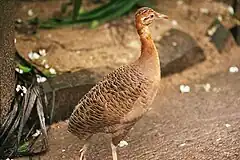| Rhynchotus | |||
| von Spix, 1825[1] | |||
 Przedstawiciel rodzaju – kusacz rdzawoskrzydły (R. rufescens) | |||
| Systematyka | |||
| Domena | |||
|---|---|---|---|
| Królestwo | |||
| Typ | |||
| Podtyp | |||
| Gromada | |||
| Podgromada | |||
| Infragromada | |||
| Rząd | |||
| Rodzina | |||
| Rodzaj |
Rhynchotus | ||
| Typ nomenklatoryczny | |||
|
Rhynchotus fasciatus von Spix, 1825 (= Tinamus rufescens Temminck, 1815) | |||
| Synonimy | |||
|
| |||
| Gatunki | |||
| |||
Zasięg występowania
Rodzaj obejmuje gatunki występujące w Ameryce Południowej[7].
Morfologia
Długość ciała 25,5–42,5 cm; masa ciała samic 325–1040 g, samców 260–920 g[7].
Systematyka
Etymologia
- Rhynchotus (Rhinchotus, Rhyncotus, Rhynchotis (gr. ωτις ōtis – drop)): gr. ῥυγχος rhunkhos „dziób”; -οτης -otēs „prezentować”[8].
- Nothurus: gr. νοθος nothos „fałszywy”; ουρα oura „ogon”[9]. Typ nomenklatoryczny: Tinamus rufescens Temminck, 1815.
- Nothoprocta: νοθος nothos „fałszywy”; πρωκτος prōktos „ogon, tył”[10]. Typ nomenklatoryczny: Crypturus perdicarius von Kittlitz, 1830.
Podział systematyczny
Do rodzaju należą następujące gatunki[11]:
- Rhynchotus cinerascens (Burmeister, 1860) – kusacz zaroślowy
- Rhynchotus rufescens (Temminck, 1815) – kusacz rdzawoskrzydły
- Rhynchotus maculicollis G.R. Gray, 1867 – kusacz plamkoszyi
- Rhynchotus taczanowskii (P.L. Sclater & Salvin, 1875) – kusacz Taczanowskiego
- Rhynchotus ornatus G.R. Gray, 1867 – kusacz ozdobny
- Rhynchotus perdicarius (von Kittlitz, 1830) – kusacz chilijski
- Rhynchotus pentlandii G.R. Gray, 1867 – kusacz andyjski
- Rhynchotus curvirostris (P.L. Sclater & Salvin, 1873) – kusacz krzywodzioby
Uwagi
Przypisy
- ↑ J.B. von Spix: Avium species novae, quas in itinere per Brasiliam annis MDCCCXVII-MDCCCXX. T. II. Monachii: Typis Franc. Seraph. Hübschmanni, 1825, s. 60. (łac.).
- ↑ G. Cuvier: Le règne animal distribué d’après son organisation, pour servir de base à l’histoire naturelle des animaux et d’introduction à l’anatomie comparée. Wyd. 2. T. 2. Paris: Chez Déterville, 1829, s. 488. (fr.).
- ↑ W. Swainson: On the natural history and classification of birds. Cz. 2. London: John Taylor, 1837, s. 345, seria: Cabinet cyclopaedia. Natural history. (ang.).
- ↑ G.R. Gray: A list of the genera of birds: with their synonyma an indication of the typical species of each genus. London: R. and J.E. Taylor, 1840, s. 63. (ang.).
- ↑ F.A.L. Thienemann: Zur Fortpflanzungsgeschichte der gesammten Vögel. Dresden: 1856, s. 22. (niem.).
- ↑ P.L. Sclater & O. Salvin: Nomenclator avium neotropicalium: sive avium quae in regione neotropica hucusque repertae sunt nomina systematice disposita adjecta sua cuique speciei patria accedunt generum et specierum novarum diagnoses. Londini: Sumptibus Auctorum, 1873, s. 153, 156. (łac.).
- 1 2 D.W. Winkler, S.M. Billerman & I.J. Lovette, Tinamous (Tinamidae), version 1.0, [w:] S.M. Billerman, B.K. Keeney, P.G. Rodewald & T.S. Schulenberg (redaktorzy), Birds of the World, Ithaca, NY: Cornell Lab of Ornithology, 2020, DOI: 10.2173/bow.tinami1.01 [dostęp 2023-04-23] (ang.).

- ↑ The Key to Scientific Names ↓, Rhynchotus [dostęp 2023-04-23].
- ↑ The Key to Scientific Names ↓, Nothurus [dostęp 2023-04-23].
- ↑ The Key to Scientific Names ↓, Nothoprocta [dostęp 2023-04-23].
- ↑ Systematyka i nazwy polskie za: P. Mielczarek & M. Kuziemko: Rodzina: Tinamidae Gray,GR, 1840 (1831) - kusacze - Tinamous (wersja: 2023-03-12). [w:] Kompletna lista ptaków świata [on-line]. Instytut Nauk o Środowisku Uniwersytetu Jagiellońskiego. [dostęp 2023-04-23].
Bibliografia
- The Key to Scientific Names, J.A. Jobling (red.), [w:] Birds of the World, S.M. Billerman et al. (red.), Cornell Lab of Ornithology, Ithaca (ang.).
This article is issued from Wikipedia. The text is licensed under Creative Commons - Attribution - Sharealike. Additional terms may apply for the media files.